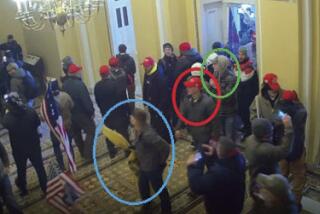First the Insurgents, Then Marines
- Share via
RIBAT, Iraq — After he served the Marines tea and sat them in his garden, the former Iraqi government official pulled up his shirt and showed his scars.
There were brown welts on his back where he had been flogged. There were small circular burns on his legs. He lifted his upper lip and revealed broken teeth. He held out his hands and displayed red lines where handcuffs had cut into his skin during eight days of captivity.
“The terrorists frighten and hurt the people here. They do checkpoints and patrols. Anyone they catch going to Al Qaim they will kill with a knife and throw him by the road,” said the former official, who asked a Los Angeles Times reporter traveling with the Marines not to publish his name for fear that insurgents would kill him and his family.
“Frankly, I don’t like the American occupation,” he said. “But I prefer the American occupation to occupation by Al Qaeda.”
A mission of more than 1,000 Marines, one of the larger deployments since the battle of Fallouja in November, has pressed this week through villages along the Euphrates River near the border with Syria looking for insurgent strongholds.
The Marines launched the campaign Sunday and were immediately engaged in sharp fighting. They have come across few insurgents since, but they have found plenty of people who complain about the guerrillas.
The Marines project a fearsome presence when they come into a town: convoys led by rumbling tanks, followed by armored amphibious vehicles bristling with guns. The Marines fan out, hustle people from their homes with stern commands and set off “controlled explosions” -- detonations of suspicious cars, possible land mines and improvised bombs.
Nearly every day, the Iraqis provide the Marines with information about foreign insurgents, who appear to play a prominent role in this part of western Iraq. The fighters have been pouring into the towns in greater numbers since U.S.-led forces seized Fallouja, which had been the capital of the insurgency.
Residents say insurgents threaten, beat and sometimes kill those who do not cooperate with them. They say the rebels take over their homes and cars, prevent them from seeking jobs with the Iraqi security forces, and endanger their towns by launching attacks against Americans from their backyards.
The residents say they do not like the U.S. occupation, and worry that speaking to Marines could bring the insurgents’ wrath after the troops leave.
“We must go inside,” one man told Marines who were questioning him in the street. “It is not safe to speak here.”
Others struggle to communicate with the troops, who often lack interpreters. On Friday, an old man spoke animatedly to a frustrated Marine for nearly 15 minutes, at one point sketching what appeared to be a picture of the Syrian border in the dusty ground outside his home.
“I guess he’s trying to say that they all went to Syria,” the Marine said.
As the Marines have swept through villages in the Ramana area of western Al Anbar province, a region of smugglers, criminal tribes and Al Qaeda safe houses, they have relied on locals to tell them where mines have been planted and where insurgents might be hiding. Villagers have even named insurgents and their collaborators.
“We haven’t killed as many insurgents as we wanted to,” said Maj. Kei Braun, executive officer of Lima Company, 3rd Battalion, 25th Regiment, one of the units leading the campaign. “But we also haven’t killed any civilians. There hasn’t been much collateral damage. So I think we’ve made friends here. We’re probably winning some hearts and minds.”
But Marines can be a gruff bunch during a sweep, and it was evident traveling with Lima Company that some residents resented that troops had trampled through their homes.
On Friday, Marines systematically went into houses, toppled stacks of blankets and pillows, and walked through garden plots to question residents. With their helmets, sunglasses, flak jackets and guns, they were an imposing presence.
On Wednesday, Lt. Joseph Clemmey, 26, of Worcester, Mass., commander of 3rd Platoon, Kilo Company, ordered a group of about 20 detained women to unveil their faces so he could make sure there were no male insurgents trying to hide among them. The women grumbled, and some refused.
“Tell them that they have no choice,” Clemmey told his interpreter. “If they don’t do it themselves, then we’ll have to force them.”
As Marines with Lima Company walked into a home in Ribat on Friday, the father of the house walked behind them to be their guide.
Sgt. Guy Zierk turned and violently pushed the man out of the house. The Iraqi smiled nervously as he retreated. Another Marine gave him a backhanded slap to the face as he rushed past.
“He could’ve been wearing a suicide vest,” a Marine said.
As the troops left, the man glared at them while puffing a cigarette across the street.
Marines also take over homes, temporarily casting out families in minutes if they think a house is a secure location to plan their next move.
“These children belong to your brother?” Zierk asked a man standing in a garden. A woman and three children sat on the home’s front step. A puppy chained to a pole yipped at the Marines. The man said he was an uncle of the children.
“You, your brother’s children, go. Now!” the sergeant commanded.
The family took the dog too.
Whatever inconveniences the Marines had brought, the former Iraqi government official seemed glad to see them. He invited them to his home, afraid that malicious eyes might be watching, and told them that foreign fighters had held his town hostage for a year. The insurgents fled to Syria four days ago.
“They tried to harm me because I worked for the government,” the man said. “They held me for eight days until my tribe forced them to let me go. They said that if you kill me, my tribe would kill four of Al Qaeda.”
The man told the Marines that the U.S. mandate limiting each Iraqi household to one firearm and a small amount of ammunition had hindered the town’s ability to defend itself. He also said Iraq’s porous borders were endangering residents.
“If Americans or Iraqis close the border, the terrorists would not be able to come back,” he said. “But if you leave town tomorrow, they will be back, and they will kill anyone who has helped the Americans.”
Why then did he choose to speak to Marines about the insurgents who had controlled his town?
“Because they are bad guys,” the man said. “Ask anyone here. These four days when the terrorists have gone have been so different from when the Americans came.”
More to Read
Sign up for Essential California
The most important California stories and recommendations in your inbox every morning.
You may occasionally receive promotional content from the Los Angeles Times.













